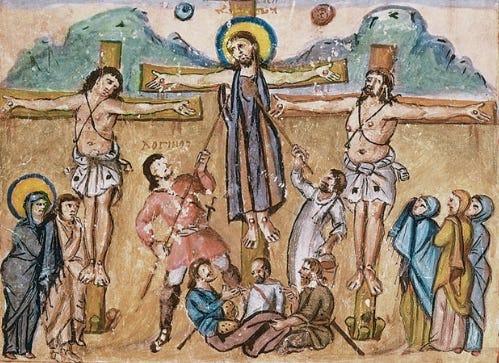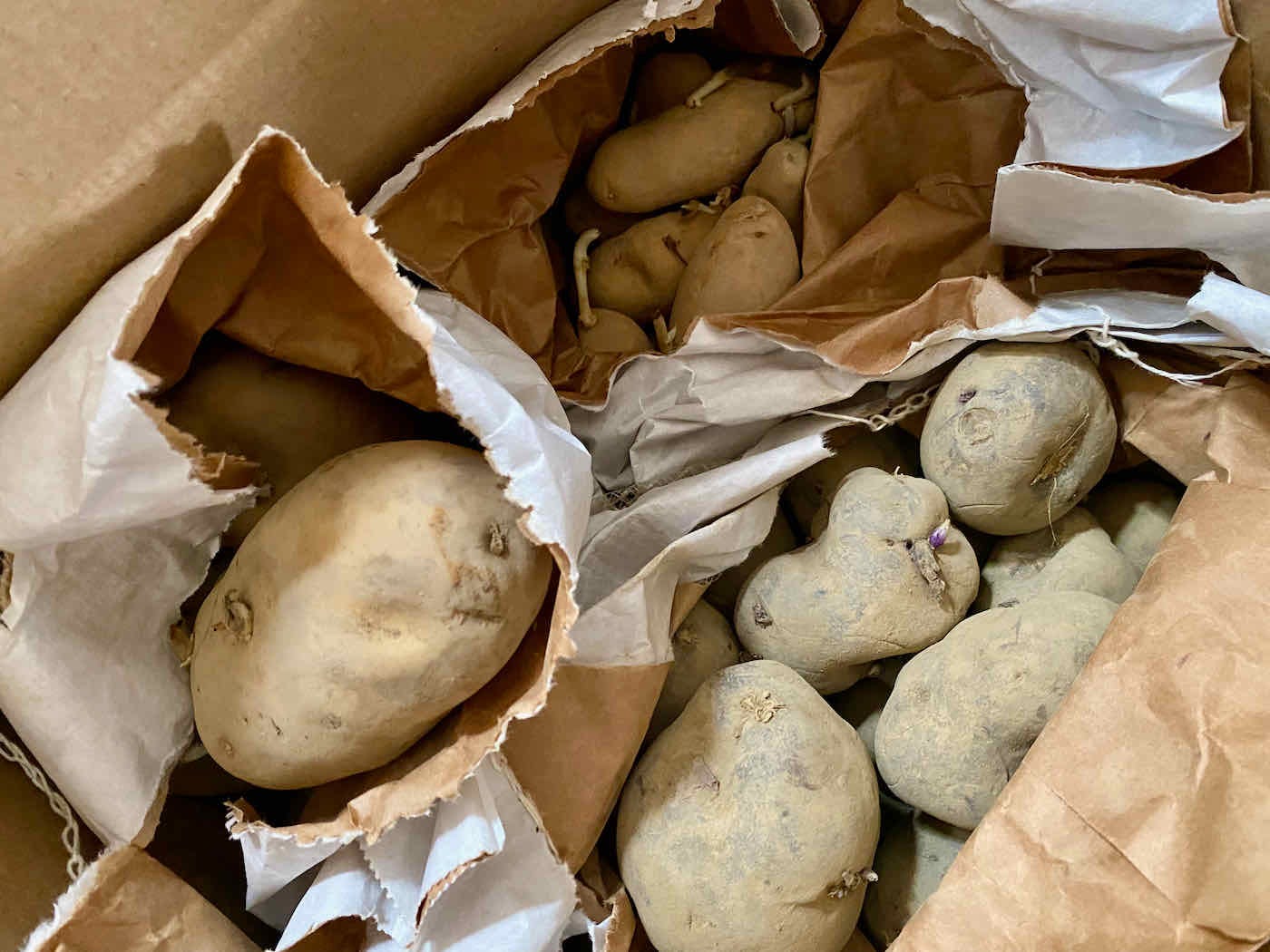Burial Mounds
Some fragmented thoughts on Good Friday, the reality of death, the complexity of grief, and the truth of being human
Friday, April 15
Grand Rapids, Mich.
Hello, dear reader.
I’ve struggled to write this week, so let me preface this letter to you with a request for grace. Most weeks, I try to start my letters to you a few days in advance, so that I have time to consider whether anything I write might get me canceled. It’s not that I’m particularly afraid of cancellation, but if and when that day comes, I want it to be for a very good reason. Anyway! All this to say: these are my (mostly) unedited thoughts.
As I was thinking about what I wanted to say to you, I remembered a Friday a few years ago at the Farminary, when we were out in the garden planting potatoes. It was Good Friday. I know it was Good Friday, because my friend Annalise looked at the little hills of soil that we were making and said simply, “Burial mounds.”
Burial mounds.
We have lived through so much death over the past few years. The toll from Russia’s invasion of Ukraine mounts. The war in Yemen is now into its second decade; mostly far from the headlines, more than 350,000 people have been killed. Two gay men were found dead in their homes this week in Sligo, Ireland; the police believe they had been targeted because of their sexuality by a man who had plans for more murders. And here in Grand Rapids, we’re grappling with the killing of Patrick Lyoya, a Congolese refugee shot in the back of the head by a police officer after what should have been a routine traffic stop.
So many burial mounds.
Extreme and exceptional drought continue in huge swaths of the American West and Southwest, while extreme floods in eastern Australia have devastated the homes of both humans and wildlife. The rainforest of the Brazilian Amazon is being destroyed at the fastest rate in years, with incalculable loss of biodiversity. In the past year, dozens of kinds of animal and plant have been declared extinct. Democracy is declining worldwide. Empathy and civility seem to be endangered species too. And what is truth anymore?
So many burial mounds.
The pandemic continues. More than 6 million people are known to have died from COVID-19. And then there are the other pandemic-related losses—trips not taken, meals not shared, relationships frayed and broken by disagreements about vaccines and masking, the still-emerging consequences of Long COVID, the continued marginalization of disabled people.
So many burial mounds.

On the cross, perhaps lost for his own words, Jesus summoned the first line of Psalm 22. “My God, my God,” he cried out, “why have you forsaken me?” As I sit here, surveying the burial mounds, I also want to ask: How have we so consistently forsaken God as well as one another?
On Good Friday, we sit in sorrow with the truth that death is an inescapable part of life—and we reckon with the reality that, stretching back into time immemorial, humans have behaved in ways that have fostered death. We have not honored the sacredness of the breath of life in one another and in all of God’s creatures. We have not loved well.
In a continued sign, perhaps, of my depravity, I spent a little time on Twitter this morning. I saw people who observe Good Friday warning others against the minimizing of grief and urging others not to rush past today’s sadness, or tomorrow’s. Don’t rush toward resurrection, they said. Don’t power-walk past despair. I get it! I, too, dislike the clamor for Easter when we haven’t even seen the sun set on Good Friday and Holy Saturday. Especially in a culture that so often wants to diminish suffering and gloss over pain, particularly if it’s not one’s own, it is good to be attentive to the reality of death and all that accompanies it. It is right to contemplate the brutality, cruelty, and hard-heartedness that brought about Jesus’s death. It is holy to sit in the sorrow of this aching world.
Yet I also want to push back against a false binary that potentially underpins some such warnings—either death or life, either grief or celebration, either sorrow or gladness, either despair or hope. To be human means that we can carry the tension of both. To be human means that we can hold the complexity of the bad as well as the good, being attentive to the presence of what’s worthy of our grief as well as thoughtful about why exactly we mourn. The kind of grief we want to foster is never performative. Sorrow benefits from candor, but it gains little from self-flagellation.
When I got to talk with Krista Tippett late last year, we spoke at length about grief. “I think grief is the embrace that we no longer get to share. I think grief is the thanks that we can no longer express in person. I think grief is the love that has to find a place to go, now that the person we’re grieving is no longer here,” I said. “And I know that my grief and the grief that so many other people are experiencing in the world right now, it cuts as deep as it does because the love is as profound as it is.”
Honestly, I don’t remember saying it. There’s a recording and there’s a transcript, so I guess I did, but I don’t remember saying it. Yet I stand by every word of it.
When I think of Jesus turning to Psalm 22 in those final, painful moments of his life, I wonder whether he recognized that the psalm contains hope, too. There’s even hope in that cry of utter anguish: In expecting God not to forsake him, the psalmist expresses bewildering trust, resilient faith, and beautiful hope. In every scream of lament, one can hear faithful longing. In every tear-stained whisper of grief, one can hear an echo of love—above all the cries of faithful solidarity of a god-man who suffered alongside us and refused the temptation of any easy way out.
I guess my point in saying all this is to urge a more hospitable spirit: If you’re prone to rush to positivity, sit in the reality of grief. If, like me, you’re more likely to wallow in the sadness, make room for just a sliver of hope. If your inclination is toward insistent, almost pathological sunniness, perhaps you can invite yourself to contemplate the clouds. If your tendency is to see things in monochrome, maybe you can offer yourself the gift of recognizing that even a gloomy day contains a thousand shades of gray—an ever-changing dance of cloud and, somewhere out there, distant as it might seem, sun.
My seed potatoes arrived a couple of weeks ago. I also have a couple of potatoes in the refrigerator that I never cooked and that are now past prime eating. They’re a bit shriveled and a bit wrinkly, and one has begun to sprout. Google, in tandem with those little nubby sprouts, though, tells me that they have not lost their potential for growth. They still contain the possibility of flourishing. (A cautionary note: Often the potatoes you buy at the supermarket will not be the best candidates for planting because they’ve been treated with a chemical to keep them from sprouting—you draw your own conclusions, metaphorical and non-, about that artificial intervention. But if you do see that one of your potatoes has started to sprout, chances are you’ll be able to plant it successfully.) But first, they’ll need to rest in the darkness of good soil.
Grand Rapids feels glum today, with a gusting wind and a chill in the air. It’s as if winter is refusing to concede that its time is past. But this afternoon, after I press “send” on this letter, I’m going outside and I’m building some burial mounds. I will sit with the reality of a long-ago death as well as the ones that are still happening all around us. And I’ll dig in the soil and plant some potatoes, because death will never be the end of the story of love.
That’s it for this week. As ever, I’m always grateful to know what’s on your hearts—especially amidst the tumult and turmoil of life right now. It’s an honor to be with you in prayer—and I hope that you remember that you are loved.
I’m so glad we can stumble through all this together, and I’ll try to write again soon.
In gratitude and solidarity,
Jeff





I am 63 and this is the first time I think I felt the emotions of the day…the betrayal, the lies that were spoken, the sadness. I want to rush through them but am trying not to go there and allow myself this experience. Your message was perfect
Your message spoke to me on many levels. I'm ashamed to say my words and actions fostered the death of a marriage. I did not love well...then only 2 months after my divorce was final, my husband passed away suddenly. So many regrets and not enough time to make things right. The waves of grief overtake me at times-the loss of my love and the loss of time to make things right. Now I'm grieving the loss of my father's health and the person he once was...sickness of the body and mind have changed the person I once knew. I'm thankful for your message that we can hold both grief and hope at the same time...when you said "death will never be the end of the story of love", that gives me so much hope.